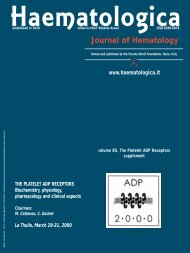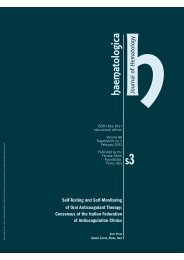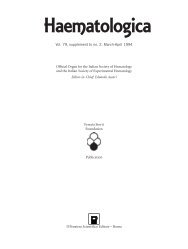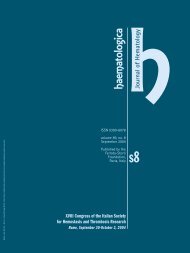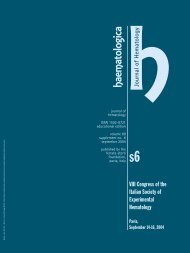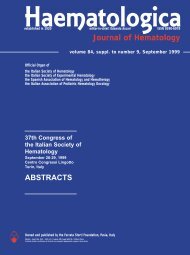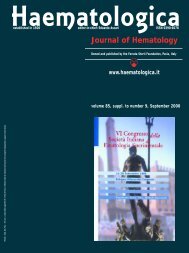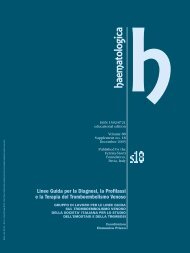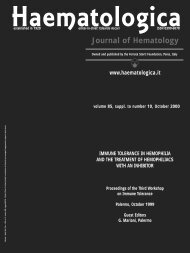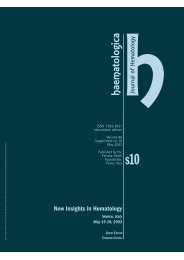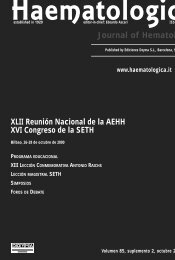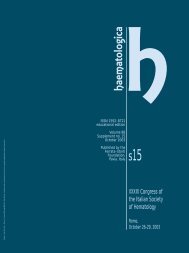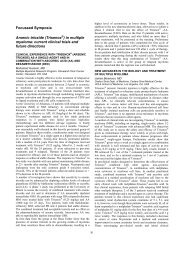[Immunobiology of Tolerance Induction]Perspectives of immunotherapyfor inhibitor patientsreview paperhaematologica <strong>2003</strong>; 88(suppl. n. 12):66-68http://www.haematologica.org/free/immunotolerance2001.pdfJEAN-MARIE R. SAINT-REMYCenter for Molecular and Vascular BiologyUniversity of Leuven, BelgiumThe ultimate goal for the problematic ofinhibitor for Factor VIII (FVIII) is to preventor suppress an immune response by anentirely antigen-specific approach. Obviously,such goal is also identifiable for other commonhuman pathologies, in particular for immunediseases. It is therefore no surprise that knowledgeis accumulating so rapidly on the mechanimsby which it will become feasible to achievesuch a prevention and/or suppression.For the sake of clarity, it remains useful todivide the current attempts towards the eliminationof inhibitors in three broad categories:immune ignorance, anergy or unresponsivenessinduction, and deletion. Basic knowledge inimmunology tells us that each of these three categoriescontains a number of potentialapproaches, which are at different levels of elaborationand therefore of clinical application.Ignorance, anergy and deletion should be consideredat the level of both B and T cells, not toforget dendritic cells and the fact that B and Tcells exchange signals, which, when interrupted,can also abort an immune response.The concept of ignorance means that FVIIIbecomes invisible for the immune system. Thus,in theory, one could eliminate the main bindingsites for antibodies on the FVIII molecule. Inpractice, however, as epitopes recognized aremostly conformational, any significant changein B cell epitope is bound to be accompanied bysignificant changes in the 3-D conformation ofthe FVIII molecule, with the risk of altering itsfunction and to create novel B cell epitopes. Fortunately,only a limited number of B cell epitopesof FVIII bear a direct relevance for its function:these are the epitopes which are directlyCorrespondence: JeanMarie R. Saint-Remy, Center for Molecularand Vascular Biology, University of Leuven, Belgium.E-mail: jeanmarie.saint-remy@med.kuleuven.ac.beinvolved in the interactions of FVIII with it physiologicalpartners, such as von Willebrand factor(VWF), phospholipids (PL), FIX and so. In otherwords, reducing antibody binding to FVIIIcould be obtained by modifying only the regionscontaining the clusters of B cell epitopes.We should however keep in mind that the Bcell repertoire is continuosly renewed in man,over his entire life span, which means that everyday, a number of B cells emerge from the bonemarrow, which have the potential to react withFVIII. Whatever the situation in practice, the elegantstudies carried out by the group of Pete Lollarhave convincingly demonstrated that it is possibleto alter and reduce the binding of preformedantibodies to FVIII, by introducing mutations atkey locations, or by replacing sequences of FVIIIby their homologue sequence taken from anothermammal, such as pig. We hope to see in thevery next future that such alterations of FVIIIwould also lead to reduced immunogenicity,namely reduced capacity to elicit an immunereponse upon injection to an animal and, in fine,to man.Ignorance can also be applied at the T cell level.In fact, this corresponds to a physiologicalmechanism. Thus, in healthy individuals,autoreactive T cells are present in the circulation,which are, however, not activated. Activationdepends on a number of parameters,including the affinity of the T cell receptor (TCR)for its cognate peptide, the density of the peptidea the surface of an antigen-presenting cell(APC), the type of APC that presents FVIII, etc…Ignorance is the end result of the lack of sufficientavidity in the recognition of specific peptidesby T cells. But ignorance is rapidly lost if anincrease in TCR avidity occurs, as it would happenin inflammation.Whether or not, it would be possible to alterthe FVIII molecule in such a manner as to reduceT cell recognition is not known. On the onehand the size of the T cell repertoire is such thatit has the capacity to recognize virtually any epitopein the universe. In addition, the degeneratehaematologica vol. 88(supplement n. 12):september <strong>2003</strong>
IV International Workshop on Immune Tolerance in Hemophilia67nature of the TCR provides a single TCR with thepossibility of recognizing a number of differentpeptides (up to 10 6 , according to some authors!).On the other hand, T cells recognize stretches ofaminoacids with no tertiary conformation. Thismeans that single mutation/deletion in the FVIIImolecule could significantly alter T cell recognitionwith no or only minimal alteration of the3-D conformation of FVIII. The experimentalapproach of reducing T cell immunogenicity isnevertheless hampered by the fact that relevantT cell epitopes are hard to localize. Using sets ofpeptides overlapping the entire FVIII moleculepermits the identification of T cell epitopes. However,the relevance of these epitopes in the formationof inhibitor antibodies is questionable.In search for relevant T cell epitopes, it is essentialto start from the entire FVIII molecule, i.e. tomimic as closely as possible what happens in reallife. However, the frequency of T cell precursorsin peripheral blood is very low, at the verge ofdetection.Anergy should be defined as unresponsivenessto an antigen administered in a normalimmunogenic manner to an otherwise normallyimmunocompetent host. It is therefore antigen-specificand distinct from the generalimmune asthenia observed in some diseases orresulting from therapy. However, even when seenin this restricted meaning, the concept of anergycovers many different situations, the commondenominator of which being that it results fromactive cell signaling.Signaling can occur through soluble factorssuch as cytokines or by direct cell-to-cell contact.B cells are physiologically induced to anergy attwo stages. The first is just before they leave thebone marrow, in process of eliminating functionallyB cells reacting with too strong an affinitywith autoantigens. The second stage at whichanergy is induced is during the secondaryresponses occuring in secondary follicles ofperipheral lymph nodes. During this response, Bcells undergo a process called affinity maturation,which depends on random mutationsintroduced in the antibody variable parts, followedby selection. As it is random, the processcarries the risk of generating B cells with highaffinity for autoantigens, luckily prevented byanergy induction. Cross-linking of antibody variableparts at the surface of B lymphocytes is themain mechanism leading to anergy.Another way by which anergy could beobtained at the B cell level is through recognitionof antibody variable parts (idiotype) by specificanti-idiotypic antibodies. The occurrence of antiidiotypicantibodies in the regulation of the anti-FVIII response has been amply demonstrated,both in haemophilia A patients with or withoutinhibitor and in healthy individuals. There is littledoubt that these antibodies exert a selectivepressure on specific antibodies and that they areassociated with the down-regulation of anti-FVIIIantibodies in some autoimmune diseases. However,their role in the regulation of antibodiestowards allogeneic FVIII is far from being clear.Recent data have however indicated that it is possibleto generate anti-idiotypic antibodies withsufficient affinity as to neutralize the inhibitoryactivity of inhibitors with the highest affinity.Anti-idiotypic antibodies are often seen asreagents for passive administration in a setting inwhich they would neutralize circulatinginhibitors. This type of clinical application wouldby no means be devoid of interest, for instancewhen inhibitor patients have to undergo a surgicalprocedure. However, we think that the possibleclinical applications of anti-idiotypic antibodiesare much broader. Indeed, anti-idiotypicantibodies can transduce a signal within cellscarrying the corresponding idiotype at their surface.Such signal involves tyrosine kinases andprotein phosphorylation. There is strong suggestionthat the transduced signal can lead to cellapoptosis, which would then occur in exquisitelyspecific manner. Genetic engineering of antibodiesoffers many alternative possibilities: antiidiotypicantibodies can be handled in such a wayas to reinforce their affinity, their capacity to activatethe complement system or to interact withFcγ receptors at the surface of natural killer cells.Under each of those three circumstances, theresult could be B cell anergy or death.Induction of anergy at the T cell level is againa mechanism of high physiological importance.Seen from the other side, T cells require a numberof criteria to be activated. These include ahigh enough affinity of the T cell receptor, athreshold density of MHC class II molecules atthe surface of antigen-presenting cell and thepresence of co-stimulatory molecules. AutoreactiveT cell, including T cells specific for FVIII, arepresent in the peripheral blood of healthy individuals,despite effective elimination in the thymus.On top of this, haemophilia A patients haveT cells reacting also towards major T cell epitopesof FVIII. Once a sufficient threshold for activationis reached, an immune response is initiated.This can occur whenever a pathological mechanismis triggered by for instance a viral infectionor, possibly, tissue bleeding. Whether inductionof anergy can be used as a strategy to eliminateFVIII inhibitors remains to be seen. Some possibilitieshave in fact already been tested, even inthe clinics. They include the use of anti-CD40Lantibodies, antibodies to B7 molecules or CTLA-4IgG constructs, alone or in association.Although of interest, the likelihood is weak thatsuch strategies would lead to long-lasting anergy,the rule being that normal responsiveness isrestored as soon as the inhibiting agent is nolonger administered together with FVIII.One promising approach is to use peptidesderived from FVIII and carrying T cell epitopes.Administration of such peptides could result inanergy induction, provided co-stimulation is preventedat APC level. Many questions first requirean answer before embarking on this, the mainhaematologica vol. 88(supplement n. 12):september <strong>2003</strong>



